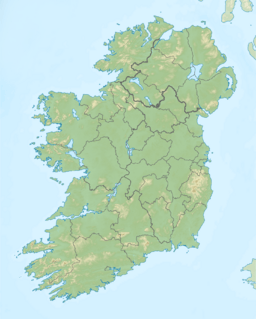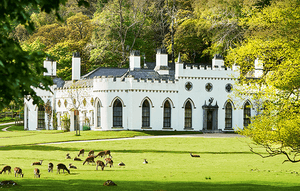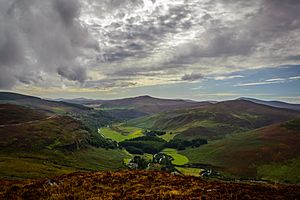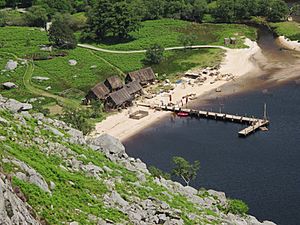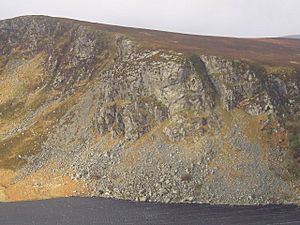Luggala facts for kids
Quick facts for kids Luggala |
|
|---|---|
| Fancy Mountain | |
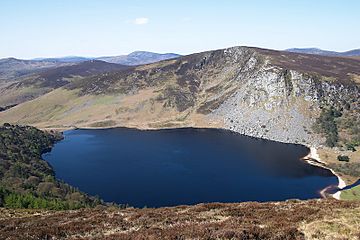
Luggala behind Lough Tay
|
|
| Highest point | |
| Elevation | 595 m (1,952 ft) |
| Prominence | 110 m (360 ft) |
| Listing | Arderin |
| Naming | |
| Native name | Error {{native name}}: an IETF language tag as parameter {{{1}}} is required (help) |
| English translation | Hollow of the hill |
| Pronunciation | |
| Geography | |
| Location | Wicklow, Republic of Ireland |
| Parent range | Wicklow Mountains |
| OSI/OSNI grid | O1501307403 |
| Topo map | OSi Discovery 56 |
| Geology | |
| Mountain type | Granite with microcline phenocrysts |
| Climbing | |
| Easiest route | Wicklow Way, from R759 |
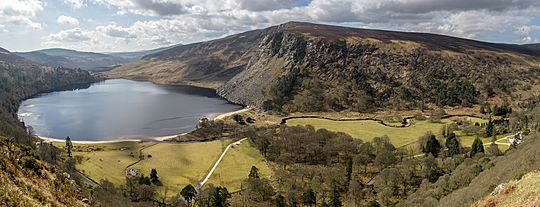
Luggala (which means "Hollow of the hill" in Irish), is also known as Fancy Mountain. This mountain is 595 metres (1,952 ft) tall. It is the 230th-highest peak in Ireland on the Arderin list. Since it is below 600 metres (2,000 ft), it is not on the Vandeleur-Lynam or Hewitt lists.
Luggala is located in the northeastern part of the Wicklow Mountains in Ireland. It looks over Lough Tay, a beautiful lake at the bottom of its steep granite cliffs. These cliffs are on the eastern side of Luggala. Besides being a very scenic spot in County Wicklow, Luggala's eastern cliffs are popular for rock climbing.
Luggala and Lough Tay are part of a large 5,000-acre (2,000 ha) private area called the Padulli di Vighignolo Estate. This estate also includes Luggala Lodge. The estate started in the 1700s with the La Touche family. Then, the Guinness family owned it from 1937 until 2019. This estate has been used to film movies like Braveheart (1995) and TV shows like Vikings (starting in 2013). Many famous artists and musicians, such as the Beatles and Michael Jackson, have also visited. Some parts of the estate are open for the public to visit.
Contents
Understanding the Name of Luggala
Luggala is known by a few names. Its Irish name, Log an Lágh, means "Hollow of the hill". It is also called Fancy, which comes from an old Irish word meaning "ash-tree". The nearby Cloghoge River flows from Lough Tay into Lough Dan.
Exploring Luggala's Geography
Luggala is found in the northeastern part of the Wicklow Mountains. It stands right above Lough Tay. This lake is at the base of Luggala's steep granite cliffs on its eastern side. The other sides of the mountain are much gentler and are mostly covered in heather plants.
Luggala is quite a lonely mountain. There is a deep valley between it and its only close neighbor, Knocknacloghoge, which is 534 metres (1,752 ft) tall and lies to the south. From the far northeast, Luggala is overlooked by the larger mountain of Djouce, which is 725 metres (2,379 ft) high. Luggala is the 230th-highest mountain in Ireland on the Arderin list. Because it is less than 600 metres (2,000 ft) tall, it is not on the Vandeleur-Lynam or Hewitt lists.
The History of Luggala Estate
Luggala is part of the 5,000-acre (2,000 ha) Luggala Estate. This estate was also known as the Guinness Estate because the Guinness family owned it for a long time. A wealthy art supporter named Garech Browne owned it until he passed away in 2018. He was a great-great-great-grandson of Arthur Guinness. In 2018, the Luggala Estate included Luggala mountain, Knocknacloghoge mountain, all of Lough Tay, and part of Lough Dan.
The La Touche family, who started the Bank of Ireland, first developed the estate. In 1787, Peter LaTouche built the Gothic style Luggala Lodge. It was a hunting lodge designed to look like Strawberry Hill House in London. In 1937, Ernest Guinness bought the Luggala Estate. He then gave it as a wedding gift to his daughter Oonagh when she married for the second time. She later gave the property to her son Garech in 1970. Some famous family members are buried on the estate, including Tara Browne, whose story inspired the Beatles song, A Day in the Life.
By 2018, Luggala Lodge was a large house with seven bedrooms. The whole estate had many buildings. The buildings on the estate, including the Lodge, have been rented out. Famous guests like Mick Jagger, the Beatles, and Michael Jackson have stayed there. The estate and its grounds have been used as filming locations for movies such as Zardoz (1974), Excalibur (1981), Braveheart (1995), and King Arthur (2004). It was also used for the TV series Vikings (from 2013), where it was the fictional village of Kattegat.
In 2017, before he passed away, Garech Browne put the estate up for sale for 28 million euros. In 2006, Browne had sold 1,600 acres (650 ha) of the estate to the Irish government for 1.6 million euros. This part is now part of the Wicklow Mountains National Park. In August 2019, it was reported that the estate was sold to a buyer from another country for less than the asking price. In October 2019, newspapers said that Italian Count Padulli di Vighignolo and his wife Carolyn Dolgenos bought the estate for about 20 million euros.
In December 2019, RTÉ showed a documentary called Last Days at Luggala. It was about Garech Browne's last years on the estate until he died in 2018. In January 2020, all the items from the estate that Browne owned were sold at an auction in London by Sotheby's.
Public Access to Luggala
In 2018, a trust that owned the Luggala Estate put up new "private property" signs. They also put a notice on a gate often used by the public, called the "Pier gate". This gate is just off the R759 road. The notice said the gate would be locked after 5:30 PM.
The trust explained that there are no public rights to walk on or access any part of the estate. However, previous owners had allowed people to use certain parts of the estate through the pedestrian gate.
This action caused protests from groups who enjoy hill-walking. They asked the Irish government to buy the Luggala Estate. The estate was for sale for 28 million euros and was surrounded on three sides by the Wicklow Mountains National Park.
In November 2019, it was reported that the new owners of the estate would keep the existing public access rules. This means the gate would stay open until 5:30 PM.
Fun Activities at Luggala
Hiking and Hillwalking
If you can access it, the most common way to reach the top of Luggala is from the public gate on the R759 road. This gate is known as the "Pier gates". This walk is about 7-kilometre (4.3 mi) long and takes about 2.5 hours to go to the top and back. You walk down a paved road to the Cloghoge River bridge. Then, you leave the road and climb up a 400 metres (1,300 ft) long slope to the top ridge of Luggala. You then follow the same path back to the Pier gates. There is a sandy path from beyond the bridge that goes through ferns and heather to the final ridge. However, it can be hard to find if the weather is bad or it's foggy.
A longer walk, about 12-kilometre (7.5 mi) and taking about 5 hours, includes the nearby peak of Knocknacloghoge and Lough Dan. This route is said to be one of the most beautiful walks in the Wicklow Mountains.
Rock Climbing Adventures
Luggala's granite cliffs, which face east, are a popular spot for rock climbing. However, finding the routes can be tricky, and the conditions are described as a "serious mountain crag". As of July 2019, an online climbing website lists 129 climbs here. Most of these climbs are in the Very Severe (VS) 4c to E1 5b rock climbing grade levels. There are also some very difficult routes, like Precious Metal (E7 6c) and The Great Roof (E6 5c, 6c).
The Irish Online Climbing Database lists five main climbing areas: G & H Buttresses, Woody Wall & Conifer Buttress, South Buttress, Main Face, and North Buttress. The rock here is rougher and provides better grip than the rock at Glendalough. However, unlike Glendalough, the climbing routes are not as direct and do not follow clear crack lines. It also notes that because the routes zig-zag, it is important to know how to use double ropes to avoid friction. Some classic climbs include Pine Tree Buttress (S 4a), Muskrat Ramble (HVC 4b, 5a, 4c), and Dance of the Tumblers (E1 5b).
 | Jackie Robinson |
 | Jack Johnson |
 | Althea Gibson |
 | Arthur Ashe |
 | Muhammad Ali |


